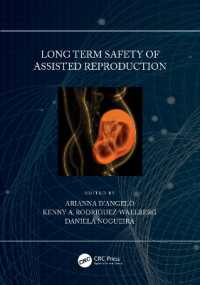- ホーム
- > 洋書
- > 英文書
- > Business / Economics
Full Description
The eleventh edition of Auditing provides a simplified but thorough approach to students understanding of auditing theory and practice. It clearly explains the key features of auditing in short, easily accessible sections to encourage effective learning.The authors have sought to provide a comprehensive textbook with up-to-date research. Auditing has been completely updated to reflect recent changes in international standards, regulatory processes and corporate governance as well as developments in the field of auditing. The new edition is ideal for anyone studying modules in auditing at undergraduate or postgraduate level, or those preparing for professional examinations set by accounting bodies such as ACCA.
Contents
1.Introduction to auditing - the why of auditing2.Corporate Governance3.The statutory framework for auditing4.Accounting requirements of the Companies Act, 20065.Auditing and accounting standards and guidelines6.Ethical standards and rules of professional conduct7.Quality control in audit firms8.Accepting appointment as auditors9.Accounting systems and internal controls10.Audit planning, audit risk and materiality11.Audit evidence and using the work of an expert12.Audit testing, sampling and analytical review procedures13.Systems-based auditing14.Business risk approach to auditing15.The audit of assets16.The audit of liabilities17.Auditing and computers18.Audit working papers19.Internal audit20.Errors, frauds and unlawful acts21.Related parties22.Use of service organizations23.Subsequent events and going concern24.Management representations25.The final review stage of the audit26.Auditors' reports to shareholders27.Auditors' reports to directors and management28.Group accounts29.Auditors' liability30.Review engagements and non-audit assurance assignments31.Value for money, performance evaluation, environmental reporting and corporate social responsibility reporting assignments32.Current issues








